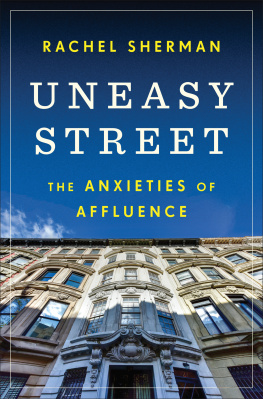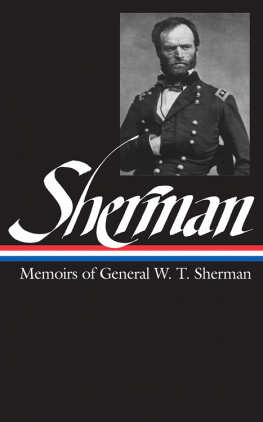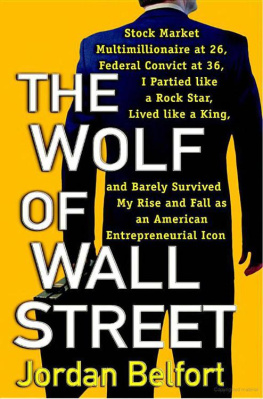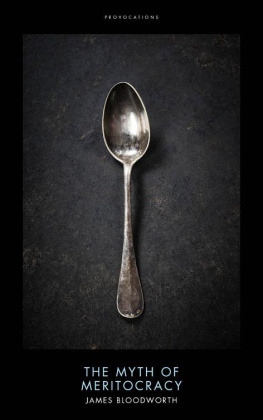
UNEASY STREET
RACHEL SHERMAN
UNEASY
STREET
THE ANXIETIES OF
AFFLUENCE
PRINCETON UNIVERSITY PRESS
PRINCETON AND OXFORD
Copyright 2017 by Rachel Sherman
Requests for permission to reproduce material from this work
should be sent to Permissions, Princeton University Press
Published by Princeton University Press
41 William Street, Princeton, New Jersey 08540
In the United Kingdom: Princeton University Press
6 Oxford Street, Woodstock, Oxfordshire OX20 1TR
press.princeton.edu
Jacket image courtesy of Shutterstock
Jacket design by Karl Spurzem
All Rights Reserved
Library of Congress Cataloging-in-Publication Data
Names: Sherman, Rachel, 1970author.
Title: Uneasy street : the anxieties of affluence / Rachel Sherman.
Description: Princeton : Princeton University Press,
[2017] | Includes bibliographical references and index.
Identifiers: LCCN 2017010629 | ISBN 9780691165509 (hardback : alk. paper)
Subjects: LCSH: WealthUnited States. | Rich peopleUnited States. | Social
stratificationUnited States. | Social classUnited States.
Classification: LCC HC110.W4 S54 2017 | DDC 305.5/2340973dc23
LC record available at https://lccn.loc.gov/2017010629
British Library Cataloging-in-Publication Data is available
This book has been composed in Adobe Text Pro
Printed on acid-free paper.
Printed in the United States of America
1 3 5 7 9 10 8 6 4 2
For Laura
The fortunate man is seldom satisfied with the fact of being fortunate. Beyond this, he needs to know that he has a right to his good fortune. He wants to be convinced that he deserves it, and above all, that he deserves it in comparison with others. Good fortune thus wants to be legitimate fortune.
MAX WEBER, THE SOCIAL PSYCHOLOGY
OF THE WORLD RELIGIONS
CONTENTS
GIVING BACK, AWARENESS,
AND IDENTITY
LABOR, SPENDING, AND
ENTITLEMENT IN COUPLES
ACKNOWLEDGMENTS
First and foremost, I am enormously grateful to all the people I interviewed for this book. They shared with me not only their time but also their thoughts, experiences, and emotions, which are not always easy to talk about. Their generosity made this project possible. I also want to thank the friends, colleagues, and acquaintances who helped me find the interviewees. For reasons of confidentiality I prefer not to name them here, but they were essential to this research.
Generous institutional and individual support made this project possible. The New School offered research funds and research assistance. Eric Klinenberg and the staff of NYUs Institute for Public Knowledge offered me the physical and mental space to begin writing this book in 201314, and a faculty fellowship at the New Schools Graduate Institute for Design, Ethnography and Social Thought (GIDEST) allowed me to continue writing the following year. Lisa Keister generously responded to an out-of-the-blue request for data. Anna Matthiesen and Jussara Raxlen carefully and insightfully coded many interviews. Guillermina Altomonte and Tania Aparicio reviewed much of the secondary research, and Guillermina combed through late drafts and proofs to identify both intellectual and grammatical inconsistencies.
As I discuss in the appendix, working on this project has been intellectually and emotionally challenging. I could not have completed it without the support of a wide range of friends and colleagues. My greatest debt on this front is to Laura Liu and Miriam Ticktin, who have been both devoted friends and central intellectual interlocutors throughout the entire project. They offered astute and often transformative comments on many, many versions of papers and chapters and provided equally indispensable moral support on more occasions than I can count. I am also deeply grateful to Karen Strassler, with whom I have been discussing the core issues of this project for more than half our lives. Her interventions throughout, especially her uniquely perceptive reading of a full draft of the book, have been essential. Juliet Schor, Teresa Sharpe, and one anonymous Princeton reviewer offered incisive and useful comments on the entire manuscript, for which I am thankful.
Many people have read parts of this work at various stages, and the book has been enormously improved by their contributions. Jeff Alexander, Angle Christin, Cindi Katz, Annette Lareau, and Robin Wagner-Pacifici offered insightful feedback at crucial moments. I am also indebted for comments and ideas to Leslie Bell, David Brody, Sbastien Chauvin, Bruno Cousin, Priscilla Ferguson, Melissa Fisher, Teresa Gowan, Rachel Heiman, Shamus Khan, Leslie McCall, Ashley Mears, Tey Meadow, Julia Ott, Devah Pager, Hugh Raffles, Lisa Servon, Lissa Soep, Millie Thayer, Florencia Torche, and Caitlin Zaloom. Carolina Bank Muoz, Penny Lewis, and Stephanie Luce helped me hone my analysis in the early stages of writing. I am grateful to participants in the Craft of Ethnography workshop at Columbia, to members of the New Schools GIDEST seminar, and to students and colleagues at my departments Brown Bag series, who read and commented on this work, as well as to the many audiences who have listened to me present on this project during the long course of its development. For their continued interest, encouragement, and help in a range of ways, I thank Michael Burawoy, Oliver Burkeman, Jeff Golick, David Herbstman, Dara Levendosky, Ruth Milkman, Debra Minkoff, Deirdre Mullane, Tim Murphy, Andy Perrin, Allison Pugh, Raka Ray, Juliet Schor, Steve Shohl, Sandy Silverman, Kim Voss, Paul VanDeCarr, and Viviana Zelizer. I also thank the Mentos, who always made me laugh, and my longtime crew of Neskowinners, who helped come up with the title.
I am fortunate to have worked with the whole team at Princeton University Press. Eric Schwartz was delightfully enthusiastic in the initial stages of the process. As I wrote the chapters, Meagan Levinson was an attentive and engaged editor, cheerfully reading multiple drafts with her eye on the prize of general accessibility. Marilyn Martins careful and perceptive copy editing much improved the book, and Blythe Woolstons indexing made it searchable. Samantha Nader, Mark Bellis, and Al Bertrand kept everything going smoothly behind the scenes. Finally, I want to recognize everyone who worked on the fantastic jacket design and the publicity, as well as all those whose labor was invisible to me but contributed in essential ways to making this book.
I feel very lucky to have a family that finds the work I do worthwhile and interesting. My mother, Dorothy Louise, engaged enthusiastically with this project from the first interview to the last punctuation mark. Tom Sherman and Nancy Middlebrook, my father and stepmother, were always eager to talk about the work and offer ideas and comments. Doug Sherman and Jeanne Henry encouraged me many years ago to think about some of the issues I explore here, and I have been fortunate to continue talking with them during the course of this project. Margaret Hunt provided unconditional love and plenty of Peruvian chicken. Last but never least, Laura Amelio contributed in more ways than I can possibly name here. I dedicate this book to her.
UNEASY STREET
INTRODUCTION
Scott and Olivia, both 39, live with their three children in a large prewar apartment in Manhattan. They spend weekends and vacations at their second home in the Connecticut countryside. Their children attend a prestigious private school. They employ a part-time personal assistant as well as a nanny-housekeeper and occasionally a personal chef. On airplanes they usually travel in business class, though when the children were small the family often flew on private planes. Fueling this lifestyle is Scotts inherited wealth, generated by a business his grandfather founded. After earning Ivy League BA and MBA degrees, Scott worked in finance for several years before deciding that the benefits of this employment did not compensate for the time he had to spend on it. He now focuses on a small technology business he started that supports nonprofits, as well as playing an active role on the board of his childrens school. Olivia is also Ivy League educated, although she comes from a working-class family. She has an MA in social work but works for pay only occasionally, spending most of her time taking care of the children and maintaining the household.
Next page










